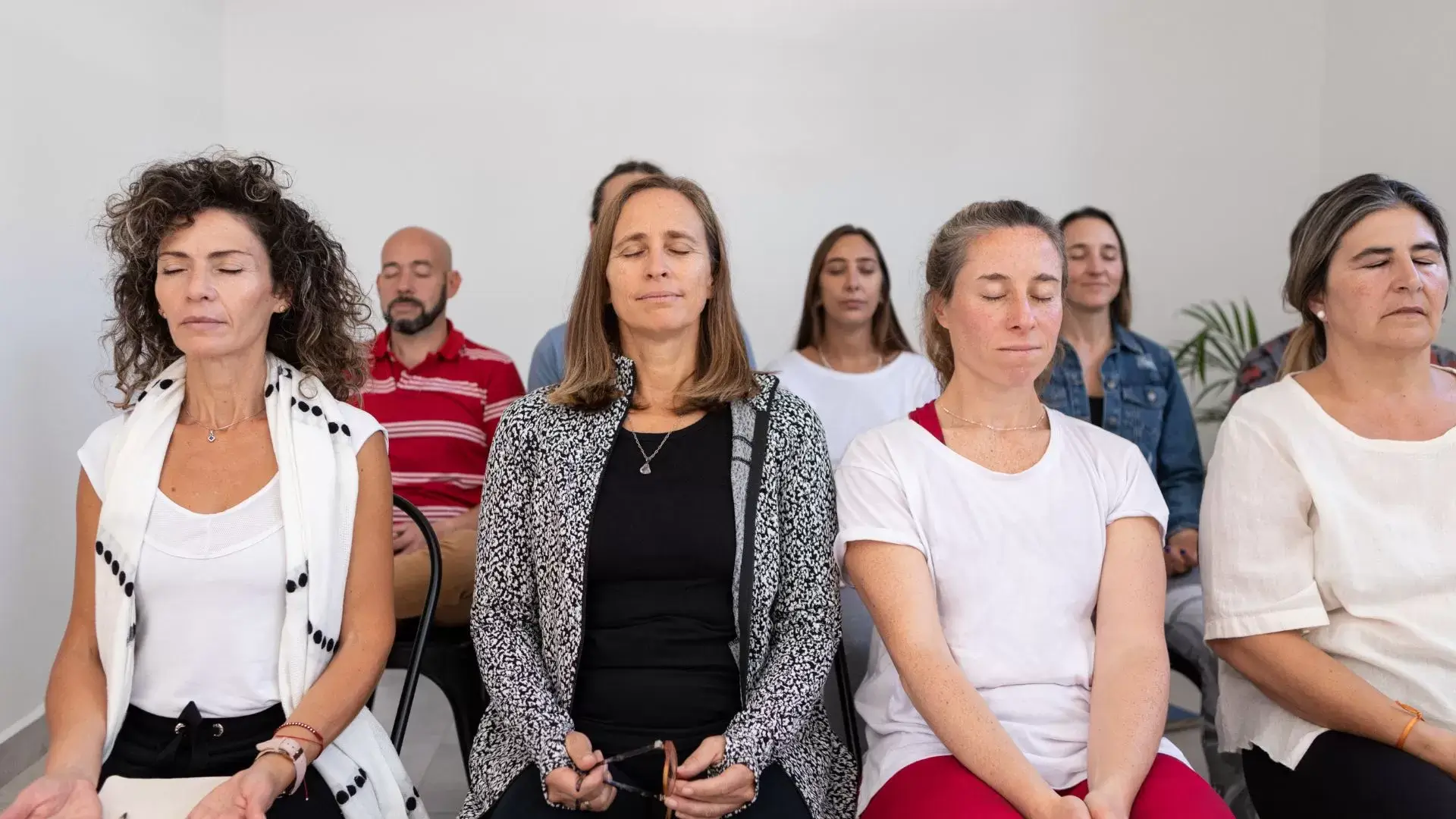Mindfulness Based Cognitive Therapy (MBCT)
Mindfulness-Based Cognitive Therapy (MBCT) is a powerful approach that blends cognitive behavioral techniques with mindfulness practices. We use it to help manage depression and relieve anxiety by fostering present-moment awareness. Through various practices like meditation and breathing exercises, we learn to observe our thoughts without judgment. This lets us recognize unhelpful patterns, promotes emotional regulation, and encourages self-compassion. MBCT not only supports mental health recovery but also enhances our resilience to life’s challenges. If you’re curious about how MBCT can work for you, there’s more to uncover about its practices and benefits.

About Psychotherapy Counsellors Center
At the Psychotherapy Counsellors Center, we recognize that seeking help is a courageous step, and we’re dedicated to providing a supportive environment where individuals can explore their mental health concerns through mindfulness-based cognitive therapy. Our approach combines therapeutic interventions that target cognitive distortions while promoting emotional well-being.
We believe that developing mindfulness skills is essential for effective stress management and emotional resilience. Through mindfulness exercises, we guide individuals in becoming more aware of their thoughts and feelings, allowing them to respond rather than react to life’s challenges. This process fosters a deeper understanding of oneself, facilitating personal growth and healing.
In our center, we emphasize the importance of a collaborative therapeutic relationship. By working together, we create a safe space where individuals can openly discuss their experiences and challenges. Our trained professionals are passionate about empowering clients with tools and techniques that enhance their emotional well-being and support their journeys toward mental health therapy.
We’re committed to helping you build a foundation of mindfulness skills that can be applied in everyday life, ultimately leading to a more balanced and fulfilling existence. Your journey is important to us, and we’re here to walk alongside you.
Introduction to Mindfulness-Based Cognitive Therapy (MBCT)
Mindfulness-Based Cognitive Therapy (MBCT) merges cognitive behavioral techniques with mindfulness practices, offering a unique approach to mental health that helps individuals recognize and reshape negative thought patterns while cultivating awareness of the present moment. At its core, MBCT is designed for depression relapse prevention and promotes emotional regulation through mindfulness meditation.
By integrating mindfulness-based interventions, we learn to develop thought awareness, which allows us to observe our thoughts without judgment. This present-moment focus encourages self-compassion, enabling us to respond to our emotions with kindness rather than criticism. As we practice mindfulness, we’re also equipped with tools for stress reduction, enhancing our overall resilience.
In MBCT sessions, we engage in various mindfulness practices that teach us to anchor ourselves in the present. This way, we’re less likely to fall back into old thinking habits that can lead to depression or anxiety. By fostering a compassionate relationship with our thoughts and feelings, we can navigate life’s challenges more effectively. In this journey, we support one another, recognizing that mental well-being is a shared endeavor. Together, we can embrace the transformative power of MBCT.
Core Principles of MBCT
The core principles of MBCT focus on cultivating awareness, fostering self-compassion, and breaking the cycle of negative thinking to promote lasting emotional well-being. Through mindfulness training, we learn to develop present-moment awareness, allowing us to observe our thoughts and feelings without judgment. This non-judgmental awareness helps us recognize unhelpful thought patterns and emotional triggers, providing us with the emotional insight necessary for cognitive restructuring.
As we engage in acceptance practices, we cultivate psychological flexibility, making it easier to navigate life’s challenges. These principles encourage us to embrace our experiences rather than resist them, fostering a deeper sense of self-compassion. Additionally, we incorporate relaxation techniques that enhance our stress resilience, enabling us to respond to difficult emotions more effectively.
Mindfulness Practices in MBCT
Engaging in mindfulness practices is crucial for deepening our awareness and enhancing our emotional resilience in MBCT. These practices serve as the foundation for developing self-awareness and achieving emotional balance. Through meditation techniques, we can cultivate a deeper understanding of our thoughts and emotions, which is particularly beneficial for mindfulness for anxiety.
We often start our sessions with breathing exercises, allowing us to ground ourselves in the present moment. These relaxation practices help to ease tension and promote a sense of calm, making it easier to engage in thought observation. By observing our thoughts without judgment, we learn effective thought management strategies that can transform our relationship with stressors.
As we progress, mindfulness skills training becomes a critical component of our journey. We explore various methods, from body scans to mindful walking, all aimed at fostering a greater sense of presence. By integrating these mindfulness practices into our daily lives, we not only enhance our self-awareness but also empower ourselves to navigate challenges with greater resilience. Ultimately, these tools equip us to respond to our experiences with compassion and clarity.

Cognitive Restructuring and Thought Awareness
Recognizing and challenging our thoughts is essential for fostering cognitive restructuring, allowing us to reframe negative thinking patterns that contribute to emotional distress. Through developing thought awareness, we can identify automatic thoughts that often lead us down a path of rumination. By practicing thought acceptance, we learn to observe these thoughts without judgment, creating space for mental clarity.
Mindful thinking encourages us to engage with our internal dialogue actively, promoting behavioral change that supports our emotional stability. As we adopt mindfulness strategies, we become more adept at recognizing when our thoughts spiral into negativity. This awareness helps us disrupt harmful patterns and redirect our focus toward more constructive perspectives.
Cognitive restructuring isn’t a one-time effort; it’s an ongoing process that cultivates resilience. By continually applying these principles, we can experience significant rumination reduction and foster a healthier mindset. As we navigate everyday challenges, let’s remember that our thoughts don’t define us. Instead, we can choose how we respond, ultimately enhancing our well-being and emotional balance. Together, we can embrace this journey toward greater awareness and stability, enhancing our quality of life through mindfulness practices.
Emotional Regulation and Balance
Building on our understanding of cognitive restructuring, emotional regulation plays an essential role in maintaining balance in our lives, allowing us to respond to challenges with greater resilience and calmness. By practicing mindfulness for emotional health, we cultivate emotional self-care, which becomes vital for managing our stress response and enhancing our overall mental health support.
Through techniques like body scan meditation, we develop mindful awareness, helping us identify our emotions without being overwhelmed. This practice encourages thought detachment, allowing us to observe our feelings with acceptance and commitment rather than reacting impulsively. As we learn self-regulation, we gain valuable tools for anxiety management, enabling us to navigate life’s ups and downs more effectively.
When we apply these skills, we find ourselves better equipped to handle difficult situations. Instead of getting caught in a cycle of negativity, we can acknowledge our feelings, understand their roots, and respond in a balanced way. In this supportive environment, we foster healthier relationships with ourselves and others, promoting emotional resilience. Ultimately, embracing emotional regulation not only enhances our well-being but also empowers us to lead more fulfilling and harmonious lives.
Stress Reduction with MBCT
Mindfulness-Based Cognitive Therapy (MBCT) offers us valuable strategies for reducing stress, allowing us to cultivate a sense of calm amidst life’s inevitable challenges. Through various mindfulness techniques, we learn to engage in present-focused therapy, which helps us recognize and manage our stressors more effectively.
We can incorporate breathing exercises and relaxation mindfulness into our daily routines, fostering emotional mindfulness that supports our mental resilience. These practices enable us to develop coping strategies that not only reduce stress but also enhance our overall well-being.
Participating in mindfulness courses further deepens our understanding of MBCT, providing us with tools to transform our relationship with stress. We become more attuned to our thoughts and feelings, allowing us to approach stressful situations with greater clarity and composure.
Ultimately, by embracing mindfulness for stress, we empower ourselves to respond to challenges with a balanced perspective. As we practice these skills, we cultivate a sense of inner peace that can sustain us through life’s ups and downs. Together, let’s commit to integrating these strategies into our lives, enhancing our ability to cope with stress effectively.
Depression Relapse Prevention
To effectively prevent relapse into depression, we can leverage the principles of mindfulness to create a robust framework for maintaining emotional stability and resilience. Mindfulness Based Cognitive Therapy (MBCT) is an essential component of our depression relapse prevention strategy. By engaging in awareness training, we become more attuned to our thoughts and feelings, allowing us to identify negative thought patterns before they escalate.
Through psychoeducation, we learn about the nature of depression and the importance of recognizing triggers associated with our mental health recovery. Mindfulness for depression equips us with tools to respond to these triggers more effectively, fostering a sense of control over our emotional landscape. Participating in mindfulness group therapy provides a supportive environment where we can share experiences and strengthen our skills.
Incorporating therapeutic mindfulness into our daily routines enhances our depression management efforts. Regular practice helps us cultivate a non-judgmental awareness of our thoughts and emotions, enabling us to disrupt cycles of rumination. By committing to this mindful approach, we not only reduce the risk of relapse but also enhance our overall well-being, setting a foundation for lasting mental health recovery.
Anxiety Management Through MBCT
Anxiety can feel overwhelming, but by integrating mindfulness practices into our daily lives, we can effectively manage our anxiety and cultivate a sense of calm and clarity. At Psychotherapy Counsellors, we can explore various techniques, including mindful breathing and focus training, which are essential components of mindfulness for anxiety relief.
Through therapy for stress, we learn to recognize our anxious thoughts without judgment, allowing us to respond with intention rather than react impulsively. Mindful living encourages us to stay present, helping us navigate stressful situations with greater ease.
By committing to regular practice, we notice significant improvements in our ability to cope with anxiety. We can start with just a few minutes of mindful breathing each day, gradually increasing the duration as we become more comfortable.
If you’re curious about how to incorporate these methods into your life, don’t hesitate to reach out. Together, we can set off on a journey toward emotional resilience, enabling us to face life’s challenges with a more grounded perspective. Through MBCT, we can transform our relationship with anxiety and reclaim our sense of peace.

Developing Self-Compassion and Emotional Well-Being
Cultivating self-compassion is a vital step toward enhancing our emotional well-being, as it allows us to embrace our imperfections and treat ourselves with the kindness we often reserve for others. When we experience difficult emotions, it’s easy to fall into the trap of self-criticism, but by practicing self-compassion, we can create a nurturing inner dialogue that encourages healing.
One effective way to develop self-compassion is by acknowledging our feelings without judgment. Instead of suppressing or ignoring what we’re going through, we can recognize that it’s okay to struggle. We’re not alone in our experiences; everyone faces challenges. Sharing these feelings with trusted friends or engaging in supportive communities can help us feel connected.
Additionally, we can incorporate mindful practices into our daily routines, such as loving-kindness meditation. This technique helps us extend compassion to ourselves and others, fostering a sense of emotional balance. As we cultivate self-compassion, we’ll likely notice improvements in our mood, resilience, and overall well-being. Ultimately, embracing self-compassion allows us to navigate life’s ups and downs with greater ease and understanding.
Mindfulness Training and Psychoeducation
As we foster self-compassion, integrating mindfulness training and psychoeducation can greatly enhance our understanding of our thoughts and emotions, enabling us to respond more effectively to life’s challenges. Mindfulness training encourages us to observe our thoughts without judgment, creating a space where we can acknowledge our feelings rather than suppress them. This practice helps us learn to recognize the patterns of our mind, fostering greater awareness in our daily lives.
Psychoeducation complements this by providing us with essential knowledge about the mechanisms of our thoughts and emotions. By understanding how our mind works, we become empowered to challenge unhelpful beliefs and cultivate healthier perspectives. This education equips us with the tools to differentiate between our thoughts and reality, reducing the power they hold over us.
Together, mindfulness training and psychoeducation create a strong foundation for emotional resilience. By regularly practicing mindfulness, we can develop a compassionate relationship with ourselves, which in turn enhances our capacity to learn and grow. As we nurture this integration, we’re better prepared to face life’s ups and downs with grace and clarity, ultimately leading to improved emotional well-being.
Coping Strategies for Negative Thought Patterns
When we find ourselves grappling with negative thought patterns, employing effective coping strategies can greatly transform our mental landscape and foster a more positive mindset. One powerful approach is to challenge our thoughts by questioning their validity. We can ask ourselves, “Is there evidence to support this thought?” or “What would I say to a friend in this situation?” This technique helps us gain perspective and reduce the grip of negativity.
Another strategy involves practicing self-compassion. Instead of criticizing ourselves for having negative thoughts, we can acknowledge them without judgment. By understanding that everyone experiences similar feelings, we create a sense of connection and acceptance, reducing feelings of isolation.
Additionally, we can develop a gratitude practice. Taking a moment each day to reflect on what we’re thankful for can shift our focus from negative to positive, reinforcing a more optimistic outlook.
Lastly, keeping a thought journal can be beneficial. Writing down our negative thoughts and examining them later allows us to see patterns and triggers, empowering us to respond more effectively in the future. Through these coping strategies, we can better navigate our negative thought patterns and cultivate a healthier mindset.
Relaxation Techniques and Focus Training
Incorporating relaxation techniques and focus training into our daily routine can greatly enhance our emotional well-being and mental clarity. These practices help us manage stress and improve our ability to concentrate on the present moment. One effective technique is deep breathing, which allows us to calm our minds and reduce anxiety. By focusing on our breath, we create a sense of grounding that can be accessed anytime we feel overwhelmed.
Another powerful method is progressive muscle relaxation. By systematically tensing and relaxing different muscle groups, we can release physical tension and promote a sense of overall relaxation. This practice not only fosters awareness of our body but also encourages us to let go of stress.
Mindfulness meditation is also essential for enhancing focus. By dedicating a few minutes each day to observing our thoughts without judgment, we cultivate a greater sense of presence. This practice trains our minds to return to the present moment, which can be incredibly beneficial when maneuvering daily challenges.
MBCT for Mental Health Recovery
Building on the relaxation techniques and focus training we’ve explored, Mindfulness-Based Cognitive Therapy (MBCT) offers a powerful approach to mental health recovery by helping individuals manage their thoughts and emotions more effectively. This therapy combines cognitive behavioral techniques with mindfulness practices, allowing us to become more aware of our mental patterns and triggers.
By learning to observe our thoughts without judgment, we can break the cycle of negative thinking that often contributes to anxiety and depression. MBCT encourages us to recognize when we’re falling into old habits, providing practical tools to redirect our focus. We find ourselves better equipped to handle stress and emotional challenges, fostering resilience in the face of adversity.
Moreover, MBCT emphasizes self-compassion, reminding us that it’s okay to struggle and that we’re not alone in our experiences. As we practice mindfulness, we develop a greater sense of presence and acceptance, which can be transformative in our recovery journey.
Group Therapy and Mindfulness Courses
Group therapy and mindfulness courses provide a supportive environment where we can explore our thoughts and feelings together, enhancing our understanding of mindfulness practices while fostering a sense of community. In these group settings, we share our experiences, which can help us realize we’re not alone in our struggles. This shared journey often cultivates a deeper connection with each other.
During mindfulness courses, we learn various techniques such as meditation, breathing exercises, and body awareness. These practices encourage us to develop a greater awareness of our thoughts and emotions, enabling us to manage stress and anxiety more effectively. As we practice mindfulness together, we can support each other in applying these skills in our daily lives.
Moreover, the group dynamic allows us to receive diverse perspectives, enriching our understanding of mindfulness and its benefits. We learn from each other’s challenges and successes, creating a safe space for growth. By participating in group therapy and mindfulness courses, we not only enhance our individual resilience but also build a supportive network that fosters healing and personal development. Together, we can navigate our mental health journeys with empathy and understanding.
Contact us at Registered Psychotherapy Counsellors
If you’re seeking support on your mindfulness journey, reaching out to registered psychotherapy counsellors can provide the guidance and expertise needed to navigate your mental health effectively. We recognize that starting on this path can feel intimidating, but rest assured, you’re not alone.
Our team of qualified professionals is dedicated to helping you develop the skills necessary for managing stress, anxiety, and other challenges through mindfulness-based cognitive therapy (MBCT). In our practice, we prioritize creating a safe, non-judgmental space where you can explore your thoughts and feelings openly.
When you contact us, we’ll work collaboratively to tailor our approach to meet your unique needs. We believe in the power of mindfulness to foster self-awareness and resilience. By integrating mindfulness practices with cognitive therapy techniques, we aim to empower you to break free from negative thought patterns and cultivate a more balanced mindset.
We invite you to reach out today—whether you have questions about our services or wish to schedule a session. Together, we can start a journey towards greater emotional well-being and a more fulfilling life.

Frequently Asked Questions
How Long Does a Typical MBCT Program Last?
When we think about typical programs aimed at improving mental health, they often last several weeks. Usually, we might find them structured over eight sessions, each lasting about two hours. This timeframe allows us to explore the material while practicing techniques in our daily lives. In our experience, this duration helps foster a supportive environment where we can share insights and grow together as we learn valuable skills for coping.
Is MBCT Suitable for Children and Adolescents?
When it comes to therapy for children and adolescents, we often wonder about its suitability. While traditional therapies can be effective, incorporating mindful practices can be beneficial. Research suggests that youth can respond positively to mindfulness techniques, fostering emotional regulation and resilience. By tailoring these approaches to younger individuals, we can help them develop coping strategies early on, enabling a healthier emotional landscape. It’s crucial to evaluate their unique needs and experiences.
Can I Practice MBCT on My Own?
We can definitely practice mindfulness techniques on our own. Many resources, like apps and books, guide us through various exercises. However, it’s important to remember that having support from a trained professional can enhance our experience and understanding. If we choose to go solo, we should be patient with ourselves and maintain a consistent practice. Ultimately, whether alone or with guidance, our journey toward mindfulness can be rewarding and transformative.
What Qualifications Do MBCT Instructors Have?
When we think about qualifications for instructors in any field, experience and training are key. Typically, MBCT instructors have extensive backgrounds in mental health or psychology, often holding advanced degrees. They usually complete specialized training in mindfulness practices and cognitive therapy techniques. Many also participate in ongoing education to stay updated on research and best practices. This guarantees they can provide us with the most effective guidance and support in our journeys.
Are There Any Side Effects of Mbct?
When it comes to exploring new therapeutic approaches, we often wonder about potential side effects. Generally, most practices like this are considered safe and well-tolerated. However, some individuals might experience temporary discomfort, such as heightened emotions or difficulty concentrating. It’s important for us to recognize these feelings as part of the process. By staying aware and communicating with our instructors, we can better navigate any challenges that arise during our journey.

